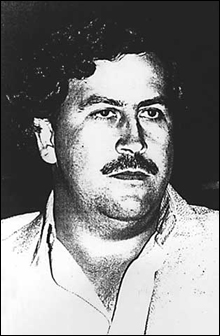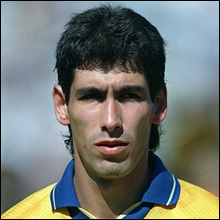
Pablo Escobar |
One of the most powerful scenes in
The Two Escobars is an interview with a Colombian assassin who chuckles as he recalls how his boss, the drug lord Pablo Escobar, compulsively listened to a soccer match on a portable radio as the gunshots of police hunting him down in a ditch rang out in the distance.
"Pablo Escobar is responsible for over 5500 murders," the executioner, nicknamed Popeye, says from behind bars in a Colombian prison. "Being a killer was his day job. But his passion was soccer. It was his escape, his cloud nine."
That moment in this new film by Jeff Zimbalist, 32, a 2000 graduate of Brown University, and his brother, Michael, 30, a Wesleyan University graduate, captures the intense link between soccer and organized crime in Colombia during the 1980s and 1990s when cocaine kingpins used soccer clubs to launder their profits.
The film, which first aired in June on ESPN’s 30 for 30 documentary series, has received glowing reviews (The Hollywood Reporter called it "masterful") and was a hit at Cannes and other film festivals. The movie will be shown again on ESPN next month, and a DVD will be out in November.
The two Escobars were connected by soccer, not blood. Pablo was the notorious head of the Medellin Cartel and a soccer fanatic who used his dope money to turn the country’s team, Nacional, into a world-class club. Andrés Escobar, dubbed "The Gentleman of the Field," was the team’s humble and God-fearing captain who believed that through the sport he could shed the country’s reputation as the home of "narco-soccer."
Until Escobars, the Zimbalists, born in Northampton, Massachusetts, and living on opposite sides of the country now (Jeff is in New York; Michael, San Francisco), were best known for Favela Rising, a 2005 film about the rise of Afro Reggae, a music group in the slums of Rio de Janeiro.
The brothers — distant relatives of the actor Efrem Zimbalist, Jr. — were in Colombia, working on a new feature (a political thriller starring Central Falls native Viola Davis), when ESPN called about making a film for the series, sports documentaries celebrating the network’s 30th anniversary.
A friend suggested the Escobars, and the Zimbalists went with it. They spent months cultivating sources and used old news footage and interviews with Pablo’s inner circle and Andrés’s family to show how the lives of these famous Colombians were tragically entwined.
"There were tears and catharsis and an outpouring of emotion," says Michael. "We were able to capture that emotion and put it on screen."

Andres Escobar |
To many, Pablo was a ruthless killer who went so far as to order the murder of a referee overseeing a match in which Nacional lost. But to the poor he was a savior who built houses, clinics, and neighborhood soccer fields where the young could escape poverty.
He poured millions into the club, lifting it out of obscurity and creating national heroes, like Andrés. It was common knowledge among players and obsessive fans that drug money was fueling the team, but most adopted a “don’t ask, don’t tell” attitude.